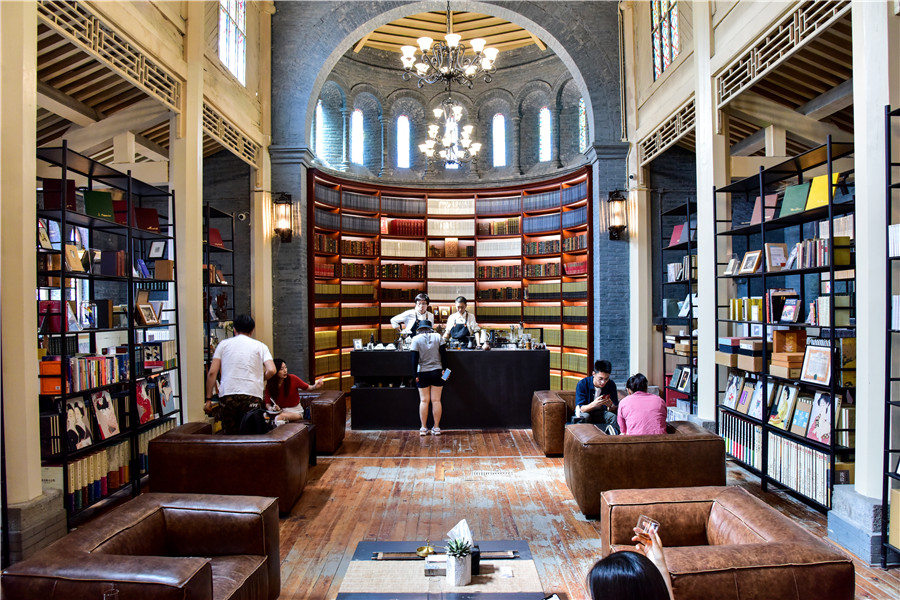Time to eat, drink, read, buy and take pix


On average, book sales account for 60 percent of the bookstore's revenue. Sales of cultural and creative products make up for about 20 to 30 percent. At one of its four stores, Mofanshuju sells coffee and drinks, which contribute 30 percent of total sales.
"We don't do standardized bookstores, and every bookstore is different. Until now, we weren't still making a profit due to the pressure of rent, a problem known to every bookstore owner. In recent years, more people have been integrating bookstores into their lifestyle. It's a long process and we are waiting for it to become better," said Jiang Xun, founder of Mofanshuju.
"I never believe e-reading will replace physical books. Many people like to turn the pages with their fingers. There's no denying the impact of e-reading on book sales. But then, books have become more quality-oriented and exquisite," said Jiang, who is also a poet and a collector of ancient books.
"We strive for immersive and situational marketing. Consumers can feel the aroma of books, have a cup of coffee, and appreciate old buildings. Such aspects present growth potential for physical bookstores."
With delicate interior decor, Mofanshuju became popular quickly even online. Many consumers prefer to go there and take pictures, he said.
The bookstore welcomes increased attention, but it hopes more people will focus on books and reading as it is not a sight-seeing spot.
Meanwhile, the government issued favorable policies to encourage the growth of physical bookstores. In 2016, 11 government departments jointly introduced a guide to support bookstore business.
The guide underlined simplifying the process of administrative inspections and approvals, providing training services, and offering favorable financial and tax support to bookstores. Besides, it stressed beneficial land planning policy.
Zhongshuge Bookstore, which had been dubbed the most beautiful bookstore in the country, now has 17 branches nationwide, including in Beijing, Shanghai, Chongqing, Yangzhou in Jiangsu province, Hangzhou in Zhejiang province, and Guiyang in Guizhou province.
The decor at each bookstore includes local cultural elements. For instance, the one in Zhongguancun area of Beijing has its children's book area designed with wooden huts in rows, which looks like a mini version of the city.
Outside the bookstore, there is a small bridge over a flowing stream. Inside, the space looks like the traditional hutong of Beijing, with arched book walls at the sides that extend from ceiling to floor.
"The biggest group of our customers are young people like college students and office workers. Many of them were not regular visitors of bookstores originally and preferred going to shopping malls and cinemas. The beautiful design and popularity online of our bookstore has attracted them and encourages them to love reading again," said Xiang Aiqun, manager of Zhongshuge Bookstore at the Beijing Rongke branch.
"Within two months of our opening, we have netted higher-than-expected sales, and sales of books made up 60 percent, the rest came from sales of coffee and creative products. We hope to become a city reading room. We also hold events frequently, such as reading club sessions, and renowned writers' book-signing and book-sharing events," she said.
As a bookstore whose fame has spread online, it has witnessed the phenomenon of people coming to take photographs. This, it said, is a double-edged sword. The popularity has attracted a large number of people to the bookstore, but it's difficult to guarantee a good experience of reading, Zhongshuge said. Sometimes, it feels compelled to limit the number of people streaming into the bookstore.
"Physical bookstores need to attract readers back by offering a unique environment, space and events. They need to keep innovating and exploring more cultural elements," Xiang said.
Page One, a stylish bookstore chain, has its 24-hour flagship store located in Beijing's downtown Qianmen area. The bookstore has an open space with three floors and occupies 2,500 square meters.
Its first store opened in Singapore in 1983. It sells a large volume of original version books in foreign languages. In 2017, listed Chinese publisher Thinkingdom House fully acquired operations of the China market of Page One and since has added more Chinese books and elements to the brand.
Li of the Leadleo Research Institute said as more consumers go to bookstores to take photographs and post online, it will actually enhance the sense of ritual in reading. More people will take to reading and treat it as a praiseworthy activity, which will be beneficial to further popularize the reading habit.
"Apart from selling books, bookstores can also make profits by selling derivative products and providing catering services. Fact is, a reader is also a consumer. With the trend of integrated growth of multiple business formats, the profit-making method of physical bookstores is diversifying," he said.
Zhang Xiaodan contributed to this story.




































